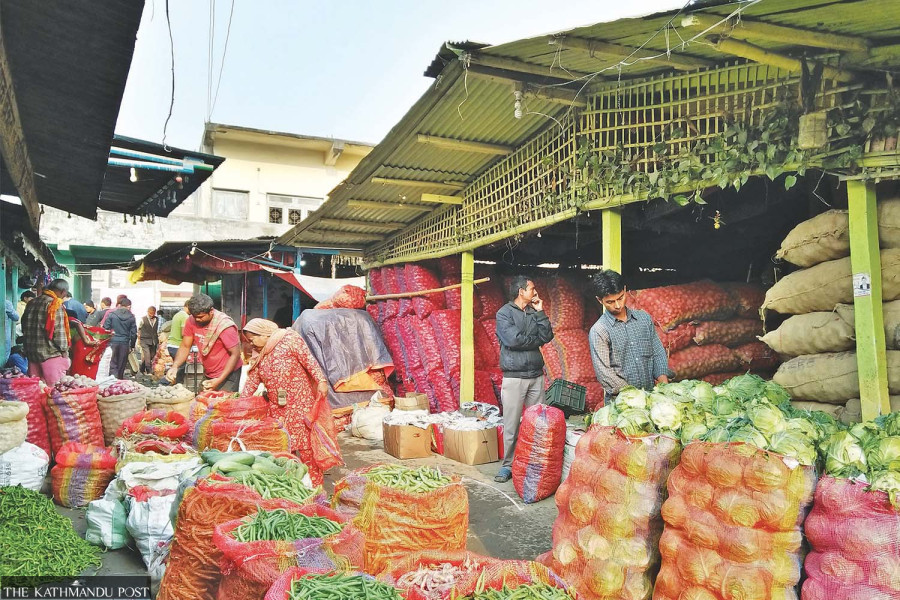Money
Monsoon pushes up vegetable prices
According to central bank, vegetable prices rose 23 percent in pre-monsoon period. Traders say prices hit higher in June.
Post Report
As the monsoon gains traction, the price of vegetables has soared drastically in the Kathmandu valley, pushing up kitchen costs.
Daily essentials like ginger, green chillies, tomatoes and potatoes are becoming prohibitively expensive for ordinary people.
Traders say that production dropped due to low rainfall during the pre-monsoon (March-May) period. And with heavy rainfall in the last few weeks, floods and landslides have disrupted the supply chain.
Before spring, the winter drought also reduced the output, vegetable traders say.
Vegetable prices have gone up steadily in the past few months. According to the macroeconomic report of Nepal Rastra Bank, the country’s central bank, vegetable prices, as measured by the consumer price index, were up 23.11 percent in mid-May.
Tomatoes, potatoes, onions, cauliflower, cowpeas, French beans, bitter gourd, smooth gourd, squash, okara, leafy vegetables, button mushrooms, broccoli, lime, chilli green, capsicum, and cucumbers became pricier within a month.
Binay Shrestha, information officer at the Kalimati Fruits and Vegetable Market Development Board, the country’s largest vegetable trading centre, said supply of home-grown vegetables had dwindled right from the winter. The shortfall is met with imports, mainly from India.
As soon as the monsoon started, flooding and landslides affected the supply system, sending prices high, he added.
And there are no signs of the prices falling. “Naturally, vegetable prices rise during the monsoon as rainfall impacts output and supply.”
Shrestha said the Kalimati fruits and vegetable market is receiving vegetables in smaller volumes these days.
Before the monsoon the market received 700 tonnes of vegetables daily, but it has now dropped to 500 tonnes.
The monsoon season in Nepal generally begins on June 13 and ends on October 2. This year, the phenomenon entered Nepal from the southwest on June 10, three days ahead of the usual onset date.
The comparative supply figure shows that the daily vegetable arrival in the Kalimati fruits and vegetable market declined 7 percent within a month.
Tomato, potato, and onion prices have seen a significant fluctuation.
The average wholesale price of tomato big (Nepali) has increased by 36.36 percent to Rs75 per kg within a month.
However, the price of small tomatoes produced in plastic tunnels has declined by 42.17 percent to Rs22.67.
Shrestha said tomato prices in the summer fall due to increased production as tunnel farming is not affected by rains, and new farming systems have flourished.
On June 18 last year, farmers threw around 90 tonnes of tomatoes on the road outside the Kalimati fruits and vegetable market to vent their anger at the low prices they were getting. The price of tomato big (Nepali) had plummeted to Rs35 per kg.
Shrestha expected that the tomato price would not dip any lower.
The wholesale price of potato (Indian) increased by 9.94 percent to Rs51.67 per kg.
The price of Mude potato, produced in summer in high-altitude places like Mude of Sindhupalchok, increased by 4.08 percent to Rs51 per kg.
The average wholesale price of onion (dry) increased by 47.09 percent to Rs97.67 per kg within a month.
Vegetable traders said that onion prices have increased due to the Indian export tax policy.
In May, India lifted the ban on onion export after nearly five months but imposed a minimum export price of $550 per tonne.
The price of cauliflower also increased by 72.73 percent to Rs95 per kg during the review period. The price of cowpea (short) increased by 23.91 percent to Rs95 per kg, and the price of French bean (local) increased by 25 percent to Rs65 per kg.
Bitter gourd now costs Rs45 per kg, rising by 28.57 percent within a month.
Smooth gourd price sharply increased by 57.14 percent to Rs55 per kg.
The price of squash round jumped 40 percent to Rs35 per kg within a month, while the price of okara shot up by 154.63 percent to Rs55 per kg.
The price of mustard greens rose 106.22 percent to Rs55 per kg, and mustard leaf rose by 55.56 percent to Rs35 per kg.
Button mushroom prices increased by 5.56 percent to Rs316.67 per kg.
Even in its season, cucumber price has increased significantly. The price of cucumber (local) increased by 58.33 percent to Rs95 per kg while that of hybrid cucumber rose by 80 percent to Rs45 per kg.
The price of capsicum increased by 2.27 percent to Rs45 per kg, while the cost of green chilli increased by 25 percent to Rs95 per kg.




 10.12°C Kathmandu
10.12°C Kathmandu













